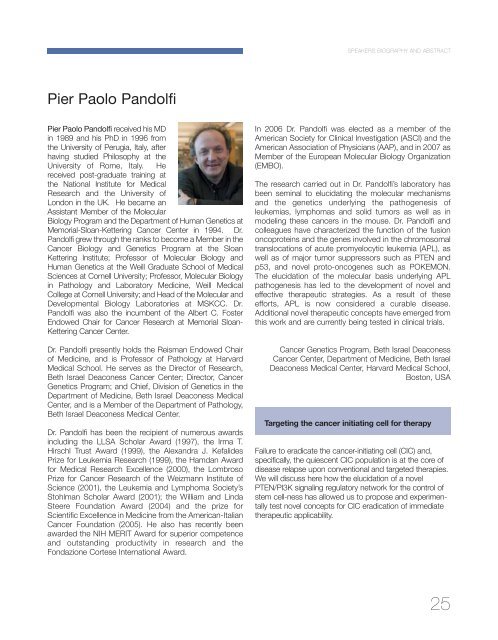PEBC Report - Programa de Epigenética y BiologÃa del Cáncer
PEBC Report - Programa de Epigenética y BiologÃa del Cáncer
PEBC Report - Programa de Epigenética y BiologÃa del Cáncer
You also want an ePaper? Increase the reach of your titles
YUMPU automatically turns print PDFs into web optimized ePapers that Google loves.
SPEAKERS BIOGRAPHY AND ABSTRACT<br />
Pier Paolo Pandolfi<br />
Pier Paolo Pandolfi received his MD<br />
in 1989 and his PhD in 1996 from<br />
the University of Perugia, Italy, after<br />
having studied Philosophy at the<br />
University of Rome, Italy. He<br />
received post-graduate training at<br />
the National Institute for Medical<br />
Research and the University of<br />
London in the UK. He became an<br />
Assistant Member of the Molecular<br />
Biology Program and the Department of Human Genetics at<br />
Memorial-Sloan-Kettering Cancer Center in 1994. Dr.<br />
Pandolfi grew through the ranks to become a Member in the<br />
Cancer Biology and Genetics Program at the Sloan<br />
Kettering Institute; Professor of Molecular Biology and<br />
Human Genetics at the Weill Graduate School of Medical<br />
Sciences at Cornell University; Professor, Molecular Biology<br />
in Pathology and Laboratory Medicine, Weill Medical<br />
College at Cornell University; and Head of the Molecular and<br />
Developmental Biology Laboratories at MSKCC. Dr.<br />
Pandolfi was also the incumbent of the Albert C. Foster<br />
Endowed Chair for Cancer Research at Memorial Sloan-<br />
Kettering Cancer Center.<br />
Dr. Pandolfi presently holds the Reisman Endowed Chair<br />
of Medicine, and is Professor of Pathology at Harvard<br />
Medical School. He serves as the Director of Research,<br />
Beth Israel Deaconess Cancer Center; Director, Cancer<br />
Genetics Program; and Chief, Division of Genetics in the<br />
Department of Medicine, Beth Israel Deaconess Medical<br />
Center, and is a Member of the Department of Pathology,<br />
Beth Israel Deaconess Medical Center.<br />
Dr. Pandolfi has been the recipient of numerous awards<br />
including the LLSA Scholar Award (1997), the Irma T.<br />
Hirschl Trust Award (1999), the Alexandra J. Kefali<strong>de</strong>s<br />
Prize for Leukemia Research (1999), the Hamdan Award<br />
for Medical Research Excellence (2000), the Lombroso<br />
Prize for Cancer Research of the Weizmann Institute of<br />
Science (2001), the Leukemia and Lymphoma Society’s<br />
Stohlman Scholar Award (2001); the William and Linda<br />
Steere Foundation Award (2004) and the prize for<br />
Scientific Excellence in Medicine from the American-Italian<br />
Cancer Foundation (2005). He also has recently been<br />
awar<strong>de</strong>d the NIH MERIT Award for superior competence<br />
and outstanding productivity in research and the<br />
Fondazione Cortese International Award.<br />
In 2006 Dr. Pandolfi was elected as a member of the<br />
American Society for Clinical Investigation (ASCI) and the<br />
American Association of Physicians (AAP), and in 2007 as<br />
Member of the European Molecular Biology Organization<br />
(EMBO).<br />
The research carried out in Dr. Pandolfi’s laboratory has<br />
been seminal to elucidating the molecular mechanisms<br />
and the genetics un<strong>de</strong>rlying the pathogenesis of<br />
leukemias, lymphomas and solid tumors as well as in<br />
mo<strong>de</strong>ling these cancers in the mouse. Dr. Pandolfi and<br />
colleagues have characterized the function of the fusion<br />
oncoproteins and the genes involved in the chromosomal<br />
translocations of acute promyelocytic leukemia (APL), as<br />
well as of major tumor suppressors such as PTEN and<br />
p53, and novel proto-oncogenes such as POKEMON.<br />
The elucidation of the molecular basis un<strong>de</strong>rlying APL<br />
pathogenesis has led to the <strong>de</strong>velopment of novel and<br />
effective therapeutic strategies. As a result of these<br />
efforts, APL is now consi<strong>de</strong>red a curable disease.<br />
Additional novel therapeutic concepts have emerged from<br />
this work and are currently being tested in clinical trials.<br />
Cancer Genetics Program, Beth Israel Deaconess<br />
Cancer Center, Department of Medicine, Beth Israel<br />
Deaconess Medical Center, Harvard Medical School,<br />
Boston, USA<br />
Targeting the cancer initiating cell for therapy<br />
Failure to eradicate the cancer-initiating cell (CIC) and,<br />
specifically, the quiescent CIC population is at the core of<br />
disease relapse upon conventional and targeted therapies.<br />
We will discuss here how the elucidation of a novel<br />
PTEN/PI3K signaling regulatory network for the control of<br />
stem cell-ness has allowed us to propose and experimentally<br />
test novel concepts for CIC eradication of immediate<br />
therapeutic applicability.<br />
25


